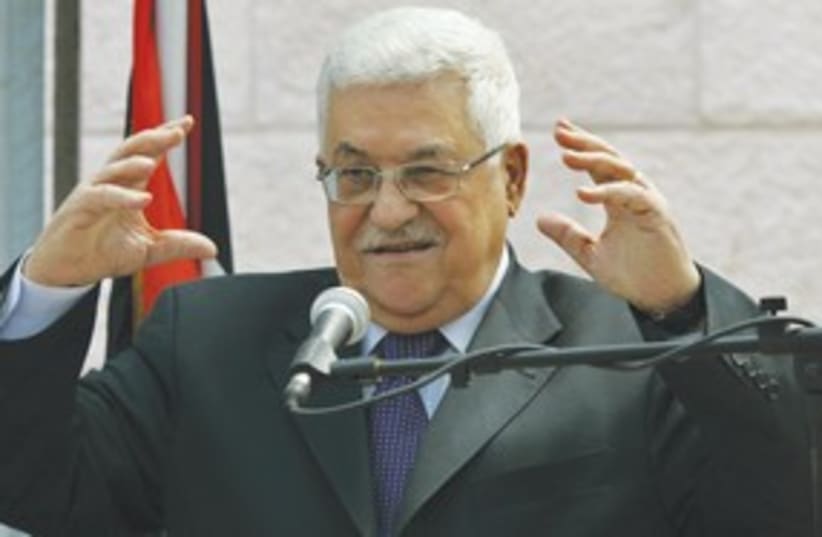RELATED:Moratorium ends, but major building not expectedSha'ath: Netanyahu can save talks by extending freezeWhile PA President Mahmoud Abbas and a senior official in Ramallah indicated that they would not pull out of the US-sponsored direct talks with Israel, other Palestinian representatives threatened to halt the negotiations if the construction in the settlements were resumed.Speaking after meeting with Jewish writers and intellectuals in Paris on Sunday, Abbas said there is only one choice for Israel: “Either peace or settlements,” the Palestinian leader said.“If it’s peace, then it’s through talks. If (Israel) doesn’t choose it, it will be a waste of time, a waste of opportunities,” Abbas said.Abbas is scheduled to meet French President Nicolas Sarkozy on Monday.The London-based Al-Hayat newspaper quoted Abbas as saying that “if there is no understanding on the settlement freeze, we will go back to the Palestinian institutions and the Arab League.”Abbas said that until two days ago, he hadn’t received any Israeli or American “formulas” and that he was still waiting for a final answer on the moratorium.The PA president pointed out that US President Barack Obama had not given the Palestinians any assurances on the issue of settlement construction or the establishment of a Palestinian state within one year.“Obama only talked about hopes,” Abbas said. “Obama undoubtedly has good intentions, but the test lies in the implementation of his good positions.”Abbas revealed that the Palestinians were demanding that a third party be present along the borders of the future Palestinian state “so as to calm all parties.” He reiterated his refusal to recognize Israel as a Jewish state.“I told the leaders of the Jewish community [in the US] when I met with them that every year they demand something new and we are not prepared to accept this at all,” he said. “When they talk about a Jewish state, it’s because they want to get rid of all the Arabs living in Israel.”Abbas also rejected the possibility of “militarizing” the intifada.
Abbas: Israel’s choice is peace or settlements
Meeting with to determine response if West Bank building resumes. Abbas: "If freeze ends, will consult Palestinian bodies, Arab League."

RELATED:Moratorium ends, but major building not expectedSha'ath: Netanyahu can save talks by extending freezeWhile PA President Mahmoud Abbas and a senior official in Ramallah indicated that they would not pull out of the US-sponsored direct talks with Israel, other Palestinian representatives threatened to halt the negotiations if the construction in the settlements were resumed.Speaking after meeting with Jewish writers and intellectuals in Paris on Sunday, Abbas said there is only one choice for Israel: “Either peace or settlements,” the Palestinian leader said.“If it’s peace, then it’s through talks. If (Israel) doesn’t choose it, it will be a waste of time, a waste of opportunities,” Abbas said.Abbas is scheduled to meet French President Nicolas Sarkozy on Monday.The London-based Al-Hayat newspaper quoted Abbas as saying that “if there is no understanding on the settlement freeze, we will go back to the Palestinian institutions and the Arab League.”Abbas said that until two days ago, he hadn’t received any Israeli or American “formulas” and that he was still waiting for a final answer on the moratorium.The PA president pointed out that US President Barack Obama had not given the Palestinians any assurances on the issue of settlement construction or the establishment of a Palestinian state within one year.“Obama only talked about hopes,” Abbas said. “Obama undoubtedly has good intentions, but the test lies in the implementation of his good positions.”Abbas revealed that the Palestinians were demanding that a third party be present along the borders of the future Palestinian state “so as to calm all parties.” He reiterated his refusal to recognize Israel as a Jewish state.“I told the leaders of the Jewish community [in the US] when I met with them that every year they demand something new and we are not prepared to accept this at all,” he said. “When they talk about a Jewish state, it’s because they want to get rid of all the Arabs living in Israel.”Abbas also rejected the possibility of “militarizing” the intifada.